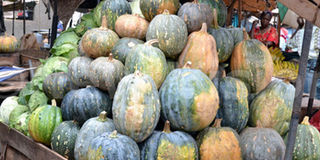New pumpkin increases earnings

Pumpkins on display in the market. file photo
What you need to know:
In order to reap maximum yields, farmers are advised to observe certain farm management practices such as practicing crop rotation to reduce chances of pests and disease attacks, writes Japhet Ruto
An agro-entrepreneur, Joel Irungu, is selling Giant Israel pumpkin variety seeds that weighs between 20 and 30 kilogrammes after three months maturity period and can rake in up to Shs20,000 a fruit when sold.
According to Irungu, the variety beats others that are already in the market which take up to six months to mature and can only weigh between 10 and 15 kilogrammes when mature.
“I am aware of the other pumpkins but farmers need quality and quantity produce for better returns,” he said.
Seeds, fertiliser
He sells the seeds for paltry Shs1,800 per packet containing 10 seeds which should be planted in one hole measuring 2x2 feet and 1 foot depth.
He says there is no need for synthetic fertiliser as manure from cow, goats or chicken can do well with the crop.
“It is recommended that the pumpkins be grown organically for better and healthy produce and I always train farmers when they buy the seeds,” said Irungu.
An acre requires 200 packets each with 10 seeds translating to 2,000 seeds and one plant can yield up to 20 fruits. Assuming all the seeds germinate and produce fruits weighing over 20 kilogramme each which can be sold at Sh36,000 a fruit, a farmer can make up to Shs100m a season.
Ready market
Irungu who also grows pumpkins within his five acres of land, has since started mobilising farmers to grow the crop as he offers ready market.
“Farmers should not worry about where they will sell the crop when mature. Immediately the crops are ready, they just get in touch with me for collecting them from the farm,” said Irungu.
Value addition
In January, he founded Malenge Tamu Products Enterprises, a company which is at its finishing stages and where he will be doing pumpkin value addition by making porridge flour, among other products for sale.
“The industry is at its final stage and in three weeks’ time I am expecting machines from Nairobi for installation to commence production. This is why I am in need of more farmers to grow the crop,” said Irungu.
Husbandry
The secret to successful pumpkins farming starts with the sourcing of good seeds, depending on your market demand.
Farmers are advised to go for direct seeding when planting since the seeds are large.
Land should be prepared to a fine tilth. Members of the cucurbit family crops should not have been planted on the land.
Well-rotted manure from cow dung or chicken droppings can be used as they increase the fertility of the soil.
The ideal spacing should be two to three metres by three metres due to the vegetative nature of the pumpkin. Spacing also depends on the variety. Proper nutrition is important during the planting and vegetative stage. That means fertiliser application should be in line with soil analysis results.
Watering should be done regularly as it promotes the uptake of nutrients and promotes good fruit formation. The crop requires enough sunlight to thrive and ample space for the vines to grow.
Each hill should have three feet of space around it. Farmers are advised to plant four or five seeds on a small garden, about three to five centimetres deep and thin down to two or three when they sprout.
The crop should be watered after planting and then every two to three days until germination.
Pumpkins grow best in moderately moist soil. Therefore, farmers should be careful not to saturate the ground. Since they like rich soils, it is advisable to feed them regularly with liquid manure.
Top dressing of the crop is done when the vines are 30cm. 100kg of CAN will be needed.
To store for a longer period of time, farmers should allow pumpkins to cure out in the sun after harvesting for a couple of dry afternoons before putting them into storage in a cool dry place with good ventilation.
In order to reap maximum yields, farmers are advised to observe certain farm management practices such as practicing crop rotation to reduce chances of pests and disease attacks.
When a farmer decides to spray they should do it late in the afternoon or early evening in order to spare pollinators that are active during the day.
Planting tips
Pumpkins are very sensitive to the cold.
Plant seeds in rows or “pumpkin hills,” which are the size of small pitcher mounds. With hills, the soil will warm more quickly and the seeds will germinate faster. This also helps with drainage and pest control.
Prepare the hills in advance with an abundance of old manure dug deep into the ground (12 to 15 inches).
If you don’t have manure, loosen the soil and mix in a 2- to 4-inch layer of compost.
When the plants are 2 to 3 inches tall, thin to 2 to 3 plants per hill by snipping off unwanted plants without disturbing the roots of the remaining ones.




